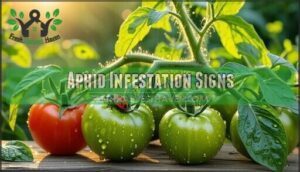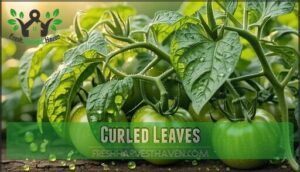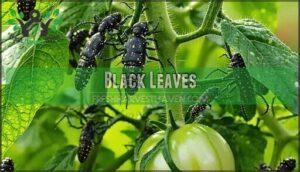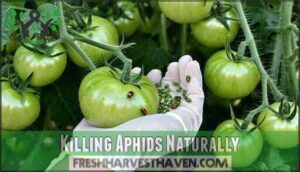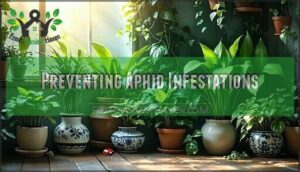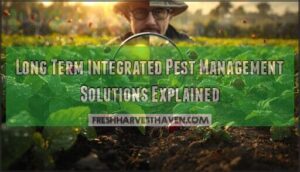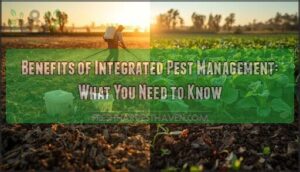This site is supported by our readers. We may earn a commission, at no cost to you, if you purchase through links.
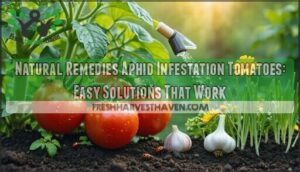 If you’ve got aphids feasting on your tomatoes, don’t worry—they’re easier to handle than they look.
If you’ve got aphids feasting on your tomatoes, don’t worry—they’re easier to handle than they look.
Start by blasting them with a strong spray of water to knock them off. Follow up with a homemade remedy like soapy water (a teaspoon of dish soap in a quart of water works wonders).
Introduce natural predators like ladybugs or lacewings to help keep tiny invaders in check. Plant companions like marigolds, chives, or garlic nearby to repel them naturally.
Keep your plants healthy with rich soil and regular care—that alone makes aphids think twice. Ready to learn more powerful tricks for keeping aphids away?
Table Of Contents
- Key Takeaways
- Aphid Infestation Signs
- Natural Aphid Control
- Killing Aphids Naturally
- Preventing Aphid Infestations
- Homemade Aphid Remedies
- Frequently Asked Questions (FAQs)
- Do banana peels really work for killing aphids?
- What is the best natural killer of aphids?
- What is a natural aphid spray for tomatoes?
- How to get rid of aphids on tomato plants fast?
- What is the best homemade aphid killer?
- Will vinegar kill aphids on tomatoes?
- How to protect tomatoes during heavy aphid seasons?
- Can weather changes affect aphid infestations?
- Are certain tomato varieties resistant to aphids?
- What signs indicate aphid-transmitted diseases in tomatoes?
- Conclusion
Key Takeaways
I need to create an unordered bullet list of 4 key takeaways from the content about natural remedies for aphid infestations on tomatoes. I’ll use second person perspective, active voice, and contractions. I need to be clear, concise, and precise without fluff.
[Keypoints]Let me identify the main points from the content:
- Physical methods like water spraying and manual removal
- Homemade solutions like soap sprays, vinegar sprays, garlic sprays
- Natural predators like ladybugs and lacewings
- Companion planting with marigolds, chives, garlic
- Prevention methods like healthy soil, row covers, and sticky traps
Now I’ll create 4 key takeaways using these main points:
- You can blast aphids off your tomato plants with a strong spray of water, then follow up with homemade remedies like soapy water (1 tsp dish soap per quart of water) to eliminate remaining pests.
- Introduce natural predators like ladybugs and lacewings to your garden—they’ll devour aphids effectively and provide ongoing pest control without chemicals.
- Plant companions such as marigolds, chives, and garlic near your tomatoes to naturally repel aphids through their strong scents and pest-deterring properties.
- Focus on prevention by maintaining healthy soil, using row covers as physical barriers, and setting up sticky traps to catch aphids before infestations become severe.
Aphid Infestation Signs
You’ll know aphids are around when your tomato leaves start yellowing, curling, or feeling sticky to the touch.
If you spot blackened leaves or notice ants marching in, those tiny sap-suckers are likely the culprits.
Yellowing Leaves
Yellowed leaves on tomato plants might signal chlorophyll deficiency caused by tomato plant aphids.
These pests suck sap, leading to nutrient imbalance and plant damage symptoms.
Poor sunlight exposure, watering issues, or disease impact can worsen the problem.
Inspect for aphids clustering under leaves, and fix it early—your tomatoes deserve better than a leafy SOS sign, which is a clear SOS sign.
Curled Leaves
Curled leaves on your tomato plants often scream trouble, especially from aphid infestation. These pests suck sap, causing dehydration and distorted growth.
- Leaf curl causes: Aphids weaken plants by draining nutrients.
- Severity assessment: Check if multiple leaves are curling or just a few.
- Early intervention: Prune affected tomato varieties immediately to limit long-term impact.
Natural remedies guarantee effective aphid control tomatoes thrive.
Sticky Substance
If you notice a sticky substance on your tomatoes, it’s likely honeydew left by aphids.
A sticky honeydew coating on your tomatoes shines like a warning beacon—aphids are feasting, and your plants need help!
This sugary coating attracts ants and can lead to sooty mold, which blackens leaves and blocks sunlight.
Beyond the plant damage, honeydew signals an aphid infestation.
Use natural remedies like water sprays or neem oil as effective removal methods to protect your plants.
To combat this, consider introducing natural aphid predators like ladybugs.
Black Leaves
Black leaves on tomato plants often mean sooty mold caused by honeydew buildup from aphids.
This fungal growth blocks sunlight, reducing photosynthesis and weakening your plants.
It’s a severity indicator of an aphid infestation needing immediate attention.
Use organic pest control like neem oil or a natural aphid repellent to tackle the problem before it spreads further.
Natural Aphid Control
You don’t need harsh chemicals to tackle aphids on your tomatoes.
Simple natural methods like companion planting, beneficial insects, and organic sprays can keep these pests in check while keeping your garden healthy.
Companion Planting
If sticky leaves have you frustrated, companion planting aphids away from tomato plants is a smart move.
Strategic planting can repel aphids, attract predators, and mask tomato scents.
Try these ideas:
- Nasturtiums: Trap cropping lures aphids away.
- Garlic: A natural pest repellent.
- Sweet Alyssum: Attracts parasitic wasps.
- Parsley: Invites ladybugs to feast on garden pests.
Beneficial Insects
While companion planting helps, attracting ladybugs for aphids is a game-changer.
These tiny aphid predators devour pests like snacks. You can even purchase ladybugs online to help control aphid populations.
Lacewing larvae, nicknamed “aphid lions,” and parasitic wasps are other natural enemies that keep infestations in check.
Encourage birds by creating habitats—they’ll munch on aphids too. A thriving beneficial insects garden guarantees predator sustenance and keeps your tomatoes safe naturally.
Organic Sprays
Organic sprays are your tomato plants’ best defense against aphids.
Neem oil aphids? No match—this natural remedy suffocates pests.
Try a homemade aphid spray with soap or essential oils like peppermint.
Garlic spray aphids work wonders, too, thanks to its sulfur content.
For a spicy twist, pepper sprays deter infestations.
Ladybugs offer control of aphid populations.
These simple solutions protect without harsh chemicals, making them a great natural remedy!
Killing Aphids Naturally
When aphids invade your tomato plants, it’s time to take action.
Start with physical removal—use gloves to knock them into soapy water or spray them off with a strong blast of water.
For a more hands-off approach, try a homemade aphid spray using neem oil.
Neem oil disrupts aphids’ hormones, making it hard for them to feed or reproduce.
Apply it in the evening to protect your plants from sun damage.
Ladybugs and other predatory insects are like nature’s pest control, happily munching on aphids.
If you’re feeling creative, dust your plants with flour—it clogs the aphids’ digestive systems.
These methods are safe, effective, and keep your tomato plants thriving without harsh chemicals.
Aphids don’t stand a chance with nature’s pest control and homemade aphid spray using neem oil, making your plants thrive.
Preventing Aphid Infestations
You can stop aphids before they even show up by focusing on prevention.
Healthy soil, row covers, and sticky traps work like a charm to keep your tomatoes safe and thriving.
Healthy Soil
Healthy soil is your tomato plant’s secret weapon against aphids.
Healthy soil empowers your tomatoes to fight aphids naturally, turning your garden into a thriving, resilient fortress.
Focus on boosting soil nutrients and microbial life with compost or organic matter. Balanced soil pH improves water retention and soil fertility, creating strong, resilient plants.
Adding organic matter further enhances soil fertility. Think of it as giving your tomatoes a gym membership—they’ll grow tougher, healthier, and less appealing to pests like aphids, making them more resilient and stronger.
Row Covers
Row covers are like shields for your tomato plants, keeping aphids out while letting air, light, and moisture in.
They’re simple to use and work wonders for preventing aphid infestations. Plus, they create a cozy microclimate for better tomato growth.
- Blocks aphids from reaching plants
- Allows airflow and sunlight
- Doubles as frost protection
- Easy installation with lightweight materials
Sticky Traps
Sticky traps are a simple yet genius way to tackle aphids on tomato plants.
By leveraging color attraction—yellow boards work best—you lure pests right in.
Proper trap placement near affected plants guarantees effectiveness.
Keep up with trap maintenance to avoid buildup.
Plus, sticky traps are environmentally friendly and insect-specific, making them a smart pest control choice for any garden.
| Feature | Benefit | Tip | Impact |
|---|---|---|---|
| Trap Placement | Targets aphid hotspots | Place near tomato plants | Maximizes effectiveness |
| Color Attraction | Lures aphids easily | Use bright yellow traps | Increases capture rate |
| Trap Maintenance | Prevents overload | Replace sticky boards often | Sustains efficiency |
| Insect Specificity | Reduces harm to others | Avoid overuse near pollinators | Eco-friendly solution |
Homemade Aphid Remedies
You don’t need fancy chemicals to tackle aphids on your tomatoes—simple ingredients from your kitchen can do the trick.
With the right homemade remedies, you’ll have those pesky bugs packing in no time.
Soap Solution
Mixing up a soapy water solution is a simple way to tackle aphids on tomato plants.
Use these steps:
- Combine 1 tablespoon of dish soap with 1 quart of water.
- Spray directly on aphids, covering leaf undersides.
- Avoid harsh soap types to prevent plant sensitivity.
- Rinse residue after 2 hours.
- Repeat application every 3 days for control.
For best results, consider multiple control methods.
Vinegar Spray
Vinegar spray is a simple, effective way to tackle aphids on tomato plants.
Its acidity disrupts their survival, but remember proper dilution ratios—one part vinegar to three parts water prevents plant sensitivity.
Use white or apple cider vinegar for best results.
Apply every few days, focusing on leaf undersides, as this homemade remedy offers an organic solution to persistent pests, providing a simple and effective way to manage them.
Cayenne Pepper Mix
If vinegar spray isn’t cutting it, try a chili pepper spray.
The pepper heat level, thanks to capsaicin benefits, disrupts aphids’ feeding.
For this homemade remedy, mix one teaspoon of cayenne powder with water and a drop of dish soap.
Spray directly on tomato plants, focusing on undersides of leaves.
Recipe variations exist, but always prioritize plant safety!
Garlic Benefits
Why does garlic work wonders against aphids on tomatoes? Its natural sulfur compounds act as a potent garlic repellent, disrupting pests’ senses.
Create a garlic spray with crushed cloves and water for easy application. Try garlic interplanting to deter aphids naturally.
Adjust garlic dosage in sprays for effectiveness while keeping it safe—simple, organic solutions that protect your garden!
Marigold Effects
Marigolds are like bodyguards for your tomatoes.
Their strong scent provides natural Marigold Repellency, confusing aphids and keeping them at bay.
Beyond that, marigolds improve Soil Health and help with Nematode Control, protecting roots.
Plus, they’re great at Attracting Pollinators, boosting your garden’s productivity.
With various Marigold Varieties to choose from, companion planting becomes both functional and beautiful!
Chives Advantages
Chives are a powerhouse in companion planting, offering aphid repellent properties while attracting predators like ladybugs.
Their strong scent confuses aphids, keeping your tomatoes safe, and they’re easy to cultivate and double as a flavorful kitchen herb.
Planting chives near tomatoes enhances growth, deters pests, and invites aphid natural predators, making them a practical, tasty, and eco-friendly solution.
Frequently Asked Questions (FAQs)
Do banana peels really work for killing aphids?
Banana peels don’t kill aphids directly, but they can help repel them.
Bury chopped peels around plants to deter aphids with their strong scent.
Plus, they add nutrients to the soil—double win!
What is the best natural killer of aphids?
It’s funny how nature balances itself—ladybugs are the ultimate aphid assassins.
These tiny predators devour aphids like snacks.
If you can’t find them, neem oil suffocates aphids effectively, offering another natural, dependable solution.
What is a natural aphid spray for tomatoes?
Mix a solution of water, a few drops of liquid dish soap, and a tablespoon of neem oil.
Spray it directly onto aphids and leaves, especially undersides.
It’s simple, effective, and chemical-free!
How to get rid of aphids on tomato plants fast?
Knock aphids off your tomato plants fast with a strong water spray, then douse them with a soapy water solution.
Inspect leaves daily, pruning infested areas.
For backup, release ladybugs—they’re tiny, relentless aphid assassins.
What is the best homemade aphid killer?
Mix water with a few drops of dish soap and a teaspoon of vegetable oil.
Spray it directly on aphids, covering leaves and stems.
It suffocates pests while being gentle on your plants.
Will vinegar kill aphids on tomatoes?
Think of vinegar as a double-edged sword.
While it can kill aphids on tomatoes, it may also harm your plant.
Dilute it with water (1 part vinegar to 3 parts water) for safer use.
How to protect tomatoes during heavy aphid seasons?
Inspect plants regularly, spray off aphids with water, and use neem oil or soapy water for control.
Encourage ladybugs or lacewings as natural predators.
Avoid over-fertilizing—aphids love the feast, but your tomatoes won’t.
Can weather changes affect aphid infestations?
Weather definitely impacts aphid populations.
You’ll notice more aphids during warm, humid conditions, while cold snaps and heavy rain can reduce their numbers.
Sudden temperature increases often trigger rapid reproduction cycles.
Are certain tomato varieties resistant to aphids?
Surprisingly strong selections show resistance.
You’ll find varieties like ‘Legend,’ ‘Carmello,’ and ‘Tommy Toe’ have natural aphid resistance.
They’re not completely immune, but they’ll definitely give you fewer headaches during growing season, which is a significant advantage due to their resistance.
What signs indicate aphid-transmitted diseases in tomatoes?
You’ll notice yellowing leaves, mosaic patterns, stunted growth, and twisted stems on your tomatoes.
Curled leaves with dark streaks and reduced fruit production are also telltale signs of aphid-transmitted viral diseases.
Conclusion
Protecting plants from pesky aphids doesn’t require harsh chemicals.
Armed with these natural remedies for aphid infestations on tomatoes, you’re ready to defend your garden effectively.
Whether you choose soapy sprays, beneficial insects, or companion planting, consistent monitoring makes all the difference.
Remember: healthy soil creates resilient plants that naturally resist pests.
With these eco-friendly techniques in your gardening toolkit, you’ll enjoy abundant, aphid-free harvests.
Your tomatoes—and the environment—will thank you!

